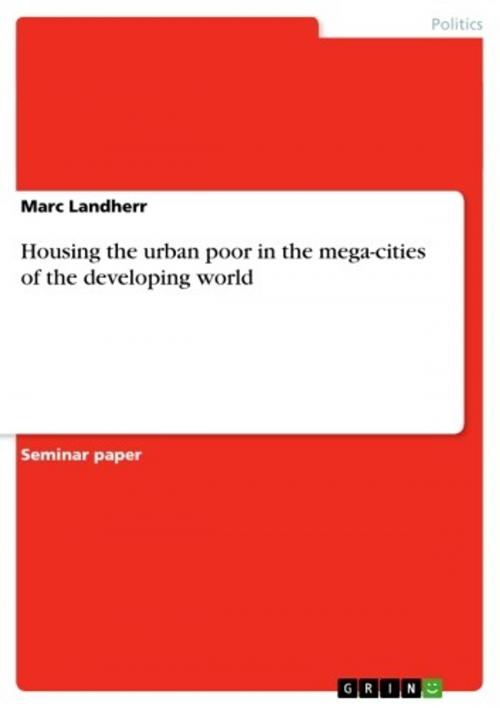Housing the urban poor in the mega-cities of the developing world
Nonfiction, Social & Cultural Studies, Social Science| Author: | Marc Landherr | ISBN: | 9783638139793 |
| Publisher: | GRIN Publishing | Publication: | August 28, 2002 |
| Imprint: | GRIN Publishing | Language: | English |
| Author: | Marc Landherr |
| ISBN: | 9783638139793 |
| Publisher: | GRIN Publishing |
| Publication: | August 28, 2002 |
| Imprint: | GRIN Publishing |
| Language: | English |
Seminar paper from the year 2001 in the subject Politics - International Politics - Topic: Development Politics, grade: 1,0 (A), University of Constance (Faculty for Management Science), course: Mega-cities worldwide and theit administration, 10 entries in the bibliography, language: English, abstract: Cities have a long tradition; they exist since thousands of years. They have always had attractive power to mankind. 200 years ago just a small proportion of men was living in cities. Today nearly three billions of people live in urban areas - this is the half of the total world population - and it is estimated by international institutions like UN or World Bank, that this number will go on growing. With an increasing number of people living in cities several problems do come up. One very - maybe the most - important problem is housing the urban poor in the mega-cities of the developing world. Tipple/Willis (1991: 1) argue that 'Housing the poor in the developing world is one of the major challenges facing mankind in the last decade of the twentieth century'. my opinion, this challenge does still exist in the twenty-first century. And this challenge does not only exist in the developing countries in Africa, Asia and South America but also in the industrialised world, like the USA or the European countries, although the problems in these countries are by far not so tremendous and apparent. Who does not know Harlem in New York? Everybody knows that there are bad living conditions. But what are the problems of the people living in Harlem compared with the problems of the inhabitants of slums and squatter areas in the developing world. To cite Tipple/Willis (1991: 1) once more: 'The major housing problem is the shortage of affordable accommodation for the urban poor; the low-income majority'. There have been many official housing programs to provide more housing possibilities or to improve the existing housings - especially in the countries of the Third World -, but none of them have been successful at all. All these programs were unable to provide enough dwellings; the history of housing construction programs has shown that all measures need substantial resources, cities often do not have. This paper wants to show the problems concerning housing the urban poor in the developing world and why these problems arise. After this more general introduction I will concentrate upon squatter-settlements in the Third World. Within this part I will point out some of the housing programs, which were used to solve the immense problems with housing the poor in the mega-cities. [...]
Seminar paper from the year 2001 in the subject Politics - International Politics - Topic: Development Politics, grade: 1,0 (A), University of Constance (Faculty for Management Science), course: Mega-cities worldwide and theit administration, 10 entries in the bibliography, language: English, abstract: Cities have a long tradition; they exist since thousands of years. They have always had attractive power to mankind. 200 years ago just a small proportion of men was living in cities. Today nearly three billions of people live in urban areas - this is the half of the total world population - and it is estimated by international institutions like UN or World Bank, that this number will go on growing. With an increasing number of people living in cities several problems do come up. One very - maybe the most - important problem is housing the urban poor in the mega-cities of the developing world. Tipple/Willis (1991: 1) argue that 'Housing the poor in the developing world is one of the major challenges facing mankind in the last decade of the twentieth century'. my opinion, this challenge does still exist in the twenty-first century. And this challenge does not only exist in the developing countries in Africa, Asia and South America but also in the industrialised world, like the USA or the European countries, although the problems in these countries are by far not so tremendous and apparent. Who does not know Harlem in New York? Everybody knows that there are bad living conditions. But what are the problems of the people living in Harlem compared with the problems of the inhabitants of slums and squatter areas in the developing world. To cite Tipple/Willis (1991: 1) once more: 'The major housing problem is the shortage of affordable accommodation for the urban poor; the low-income majority'. There have been many official housing programs to provide more housing possibilities or to improve the existing housings - especially in the countries of the Third World -, but none of them have been successful at all. All these programs were unable to provide enough dwellings; the history of housing construction programs has shown that all measures need substantial resources, cities often do not have. This paper wants to show the problems concerning housing the urban poor in the developing world and why these problems arise. After this more general introduction I will concentrate upon squatter-settlements in the Third World. Within this part I will point out some of the housing programs, which were used to solve the immense problems with housing the poor in the mega-cities. [...]















